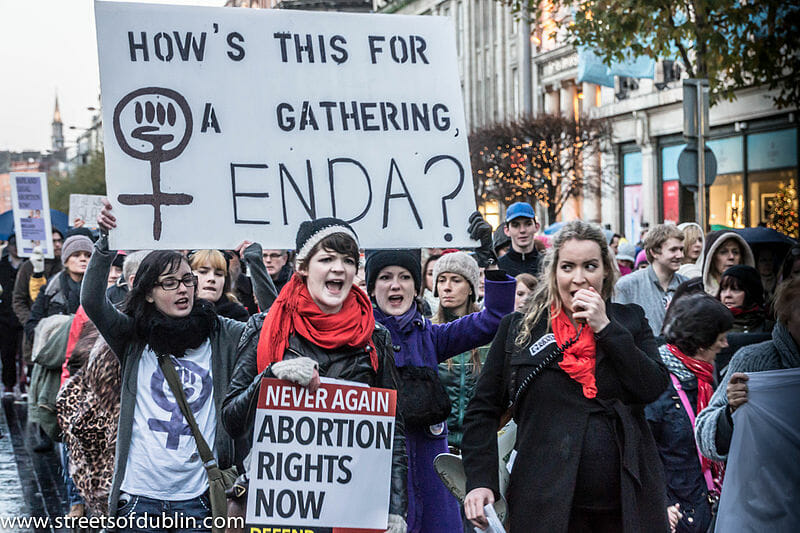Irish Expats Fly Home for Vote on Abortion
A historic referendum is giving the country a chance to abolish a ban on the procedure, which has been illegal in Ireland since 1983. Protesters in Dublin in 2012 responded to the death of a woman who was refused an abortion at University Hospital Galway. (Wikimedia Commons)
Protesters in Dublin in 2012 responded to the death of a woman who was refused an abortion at University Hospital Galway. (Wikimedia Commons)
Editor’s note: Referendum results being tallied Saturday indicated voters have overwhelmingly approved repealing Ireland’s 1983 constitutional ban on abortions.
Abortion has been illegal in Ireland since 1983, when its constitution was amended to equate an unborn child’s right to life with that of a pregnant mother’s. A historic referendum taking place Friday gives the country a chance to abolish the ban. Many Irish expatriates are flying home to vote to appeal the amendment and legalize abortion. As of Friday morning, the vote was still close after a tense campaign.
The vote concerns Article 40.3.3 of the Irish Constitution, known as the eighth amendment. The article brought on a near-total ban on abortion in Ireland, even in cases of rape and incest.
WATCH: A powerful statement from John McGuirk before Ireland’s referendum on abortion.
“When you legalize abortion, you change the culture of a country utterly. You change the way we think about life. You change the way that we as a society relate with each other.” #SaveThe8th https://t.co/lANWyw2WAK
— Live Action (@LiveAction) May 22, 2018
While the U.S. allows any citizen living abroad to cast an absentee ballot in the general and primary elections, the Irish system is much more strict. Irish citizens are not allowed to cast votes from abroad except in special circumstances—if they are diplomats or members of the military, for instance. Citizens who have lived abroad for more than 18 months aren’t allowed to vote.
The London-Irish Abortion Rights Campaign created the #HomeToVote campaign to mobilize Irish expats who are eligible to vote. The Irish Times estimates that 40,000 of the 750,000 Irish citizens abroad meet the criteria.
The Guardian reports:
Ruth Shaw and 20 of her family members and friends had flights lined up to a wedding in New York when the date was set for Ireland’s referendum on legalising abortion. None of them thought twice about what to do.
“We changed our flights,” said Shaw, who voted to lift a decades-old near-ban on abortion on Friday. “It’s really important, I’ve got two daughters.” At 6.55 am, she was waiting with Simi, nine, outside Our Lady’s Clonskeagh Parish secondary school, second in line to cast her vote before heading to the airport.
On a day of glorious sunshine and heightened emotion, polling stations across Ireland were reporting high turnout in a ballot that politicians and campaigners expect to settle the country’s position on abortion for at least a generation.
Indeed, Leo Varadkar, Ireland’s prime minister, said that if the proposal to repeal the constitutional clause is defeated, it is likely to be at least 35 years before citizens get to vote on the matter again.
The Guardian provides additional social context for the vote:
Changes in social attitudes have been in lockstep with the declining influence of the Catholic church, once the dominant voice in Ireland and a crucial player in the drive to add an abortion ban to the constitution.
But revelations of sexual abuse and cover-up by priests in recent years have shaken Ireland’s faith in the church, and the internet and social media have challenged the authority of the pulpit.
Although 78% of the population still identified as Catholic in 2016, the proportion is significantly smaller among people under the age of 35. Between 1972 and 2011, weekly church attendance fell from 91% to 30%. In Dublin, it dropped to 14%.
Irish citizens are allowed to vote until 10 p.m. local time Friday. Some highlights from the #HomeToVote hashtag are below:
I’m coming #HomeToVote ! Will be traveling 5,169 miles from LA to Dublin and will be thinking of every Irish woman who has had to travel to access healthcare that should be available in their own country. Let’s do this, Ireland! #repealthe8th #VoteYes pic.twitter.com/fZDxUIGrs9
— Lauryn Canny (@LaurynCanny) May 23, 2018
Started my own solitary 6 hour #HomeToVoteYes journey – more tired, sad and scared than I ever thought I would be. Living away from Ireland does not shield me from this. In fact, it reminds me why I had to leave my home country in the first place #TogetherForYes #hometovote pic.twitter.com/BnSNMC27Zx
— Ciara (@CiaraBurb) May 25, 2018
Dublin! Ireland! Let’s go! ?#HomeToVoteYes #repealthe8th pic.twitter.com/LYHbZo28ax
— Jengo (@JennyMayFinn) May 25, 2018
Your support matters…So proud of my cousin Claire #HomeToVoteYes from NYC for her daughter Aida and for all our daughters, sisters, mums and friends so they never have to make that lonely trip again #repealthe8th #hometovote pic.twitter.com/bxGAFILZS4
— Annie Blackmore (@annie_blackmore) May 25, 2018
Independent journalism is under threat and overshadowed by heavily funded mainstream media.
You can help level the playing field. Become a member.
Your tax-deductible contribution keeps us digging beneath the headlines to give you thought-provoking, investigative reporting and analysis that unearths what's really happening- without compromise.
Give today to support our courageous, independent journalists.






You need to be a supporter to comment.
There are currently no responses to this article.
Be the first to respond.